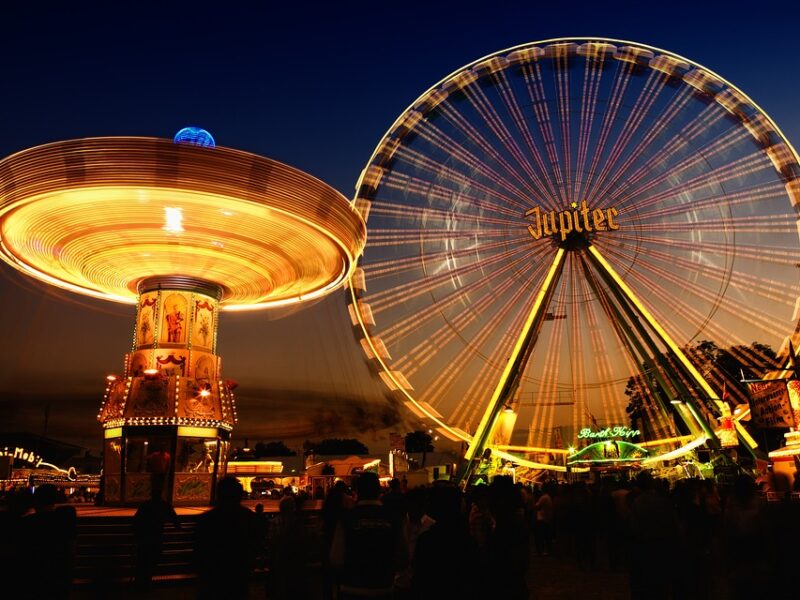In a world constantly reinventing itself, traditional experiences often shed light on evolving industries. One such unexpected source of inspiration? Fairs! At first glance, fairs, with their candy floss and Ferris wheels, may seem a world away from the cutthroat world of real estate. Yet, a deeper dive reveals that the principles and innovation fueling these vibrant events have a lot to teach the property world. And no, it’s not just about setting up tents to showcase properties.
1. The Power of Experience
Fairs are all about experience. The lights, the sounds, the atmosphere – everything combines to create unforgettable memories. In a similar vein, real estate is shifting towards a model that prioritizes the experience. Whether it’s immersive virtual tours or crafting stories around a property’s history, realtors now understand that selling a home isn’t just about bricks and mortar. It’s about selling a feeling, a lifestyle. It’s about crafting an experience.
2. Adaptability is Key
Fairs are the perfect blend of tradition and innovation. While classic attractions remain, there’s always something upcoming and thrilling to capture attendees. This teaches real estate professionals the importance of balancing tried-and-true methods with fresh, innovative approaches. In a world where digital platforms and augmented reality revolutionize house tours, remaining flexible and adaptive is not just wise; it’s necessary.
3. Community Building
Fairs are designed to bring communities together. Similarly, real estate isn’t just about homes; it’s about neighborhoods and communities. Realtors are now focusing on showcasing the community spirit, the local parks, the nearby coffee shops, and the bustling farmer’s market. After all, a house becomes a home when it’s part of a thriving community.
4. Information at Your Fingertips
Fair stalls often provide pamphlets, brochures, and detailed information. They realize that an informed customer is more likely to engage. Similarly, real estate platforms make data more accessible. Comprehensive property descriptions, neighborhood statistics, and even local school ratings are now commonplace. This approach helps potential buyers make informed decisions.
5. Embracing the Digital World
Just as fairs have become digital with online ticket bookings, navigation apps, and virtual experiences, the real estate industry is harnessing technology. Websites like home search platforms offer robust platforms for buyers, sellers, and agents, leveraging technology to simplify and elevate the real estate experience.
6. Diversity and Inclusion
Much like a fair, which embraces and showcases a vast array of cultures, talents, and innovations, the real estate sector recognizes the value of diversity. From eco-friendly housing projects inspired by global standards to architecture that reflects various cultural inspirations, the property market is becoming a melting pot of global ideas. This not only broadens the appeal of properties but also fosters an inclusive environment for both buyers and sellers.
7. Importance of Feedback and Reviews
Any successful fair will have a system for attendees to leave feedback. Whether it’s about the food, the rides, or the overall experience, this feedback is invaluable for improving future events. Customer reviews and testimonials play a significant role in real estate. Realtors and platforms are more accountable than ever, with online reviews influencing buyers and sellers alike. Embracing feedback and continually improving services is crucial to sustained success.
8. Sustainability and Responsibility
Modern fairs often emphasize sustainability, from eco-friendly rides to waste management systems. In the real estate world, there’s a growing emphasis on green buildings, sustainable architecture, and eco-friendly amenities. Not only does this appeal to the environmentally-conscious buyer, but it also ensures that the industry is playing its part in preserving the planet for future generations.
9. Continuous Learning and Training
Behind the scenes at every successful fair is a team that undergoes regular training – ensuring safety standards, improving customer service, and adapting to the latest technologies. In the real estate sector, continuous learning is vital. With changing regulations, evolving market trends, and technological advancements, realtors must commit to ongoing education to stay ahead of the curve.
10. Celebrating Successes
Lastly, just as fairs end with grand parades or fireworks, celebrating milestones and achievements is essential in the real estate industry. Be it a significant sale, a happy homeowner, or the launch of the first housing project, recognizing and commemorating these successes boosts morale and drives further innovation.
Final Thoughts
The parallels between fairs and the real estate industry testify to the universality of certain principles, no matter the domain. As we move into the future, these shared lessons and values will shape a more innovative, responsive, and vibrant real estate landscape. So, the next time you’re at a fair, take a moment to observe – there might just be a real estate lesson waiting for you amidst the roller coasters and popcorn stands.



